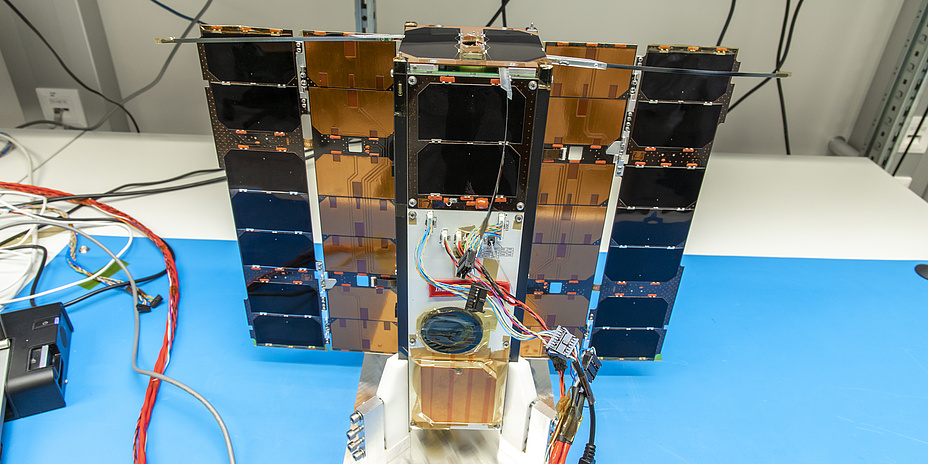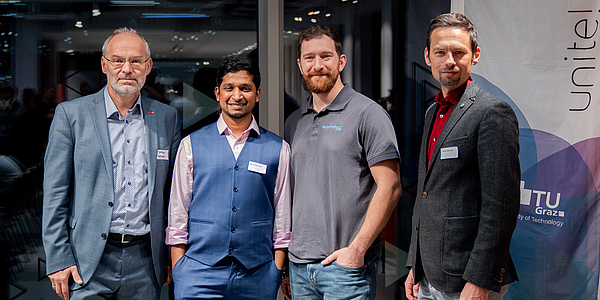OPS-SAT developed at TU Graz wins award

Despite its height of only 30cm, the OPS-SAT nanosatellite should not be underestimated: it is equipped with an experimental computer that is ten times more powerful than any of those in the European Space Agency’s (ESA) current satellites. This laboratory in the shape of a satellite has maintained an orbit close to earth since its successful launch in December 2019, and is used as an experimental platform for the latest hardware and software developments. Primarily, OPS-SAT demonstrates improvements to mission control capabilities that will be possible when satellites carry such computers and new mission software. More than 220 experiments in this context have been conducted already, including in cooperation with national space agencies such as CNES (France), DLR (Germany) and JAXA (Japan), and with universities, research institutes, industry and numerous start-ups. Massachusetts Institute of Technology (MIT) and Oxford University have also conducted experiments using OPS-SAT.
“It is very difficult to perform live testing of mission control systems. No one wants to take the risk with an existing, valuable satellite,” explains ESA on its website. “The OPS-SAT solution is to design a low-cost satellite that is absolutely safe and robust, even in the case of malfunctions due to testing. The robustness of the basic satellite itself will give ESA flight control teams the confidence they need to upload and try out new, innovative control software submitted by experimenters. The satellite can be pushed to its limits but can always be recovered if something goes wrong.”
Built at TU Graz for ESA
OPS-SAT was developed and built for ESA under the leadership of Professor Otto Koudelka and his team at the Institute of Communication Networks and Satellite Communications at TU Graz, in cooperation with (industry) partners in Austria, Denmark, France, Germany and Poland. The challenge over four years of development was to achieve the highest levels of performance and safety at low cost. To do this, the nanosatellite combines off-the-shelf subsystems typically used with cubesats with high-performance sensors, interfaces and communications units that work reliably under the unique conditions they are exposed to in orbit.
In November 2022 the OPS-SAT nanosatellite became the first ESA project ever to be nominated for the highly regarded International Space Ops Award for Outstanding Achievement, which has been awarded every two years since 2006. The prize will be presented to ESA at an international space conference in Dubai, taking place at the beginning of March 2023. Alongside OPS-SAT, NASA’s Mars helicopter, Ingenuity, will also receive the award.
Space success story with Austrian Research Promotion Agency support
“The OPS-SAT success story shows that challenging technical and scientific requirements can be met, and space sector innovations can be driven forward, using low-cost satellites,” said Otto Koudelka, Professor Emeritus and former head of the Institute of Communication Networks and Satellite Communications at TU Graz. “The Space Ops Award is a major recognition for ESA’s Operations Team, which has been supported by TU Graz from the beginning.” Professor Koudelka, who headed the OPS-SAT development project, also underlined the important role played by the Austrian Research Promotion Agency’s Aeronautics and Space Agency (ALR): “The ALR provided the initial spark for nanosatellite development at TU GRAZ back in 2005 by financing the first Austrian satellite, TUGSAT-1/BRITE-Austria, which is celebrating its tenth birthday on 25 February 2023 and is still functioning reliably. The success of the BRITE mission was an important factor in the award of the OPS-SAT commission to TU Graz. The ALR was instrumental in supporting the OPS-SAT mission at ESA.”
Would you like to receive the latest stories, news, research stories, interviews or blog posts from TU Graz directly on your smartphone or in your email inbox? Subscribe to the TU Graz Telegram newsletter free of charge.
Kontakt
Maximilian Henkel
Dipl.-Ing. BSc
Institute of Communication Networks and Satellite Communications
Phone: +43 316 873 7437
E-mail: henkel@tugraz.at




